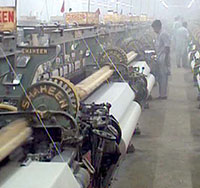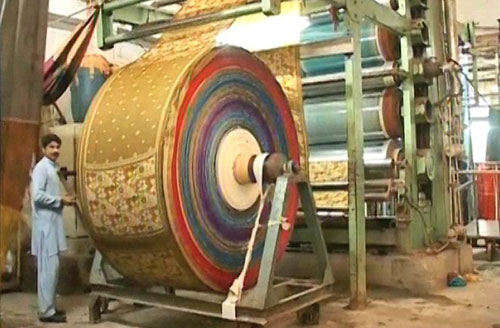"The textile industry in Faisalabad, known as the little Manchester of Pakistan, has been facing a severe financial crisis ever since the federal government announced its 2019-20 budget. The government has imposed a 17 per cent sales tax on the textile sector, which resulted in several processing units going on strikes and refusing to corporate with other stakeholders in the industry. Around 100 out of the total 150 units of the processing industry have been dysfunctional since the last 12 days."
 The textile industry in Faisalabad, known as the little Manchester of Pakistan, has been facing a severe financial crisis ever since the federal government announced its 2019-20 budget. The government has imposed a 17 per cent sales tax on the textile sector, which resulted in several processing units going on strikes and refusing to corporate with other stakeholders in the industry. Around 100 out of the total 150 units of the processing industry have been dysfunctional since the last 12 days. This closure has not only disrupted the entire processing chain but also forced several weaving and power loom business to shut down.
The textile industry in Faisalabad, known as the little Manchester of Pakistan, has been facing a severe financial crisis ever since the federal government announced its 2019-20 budget. The government has imposed a 17 per cent sales tax on the textile sector, which resulted in several processing units going on strikes and refusing to corporate with other stakeholders in the industry. Around 100 out of the total 150 units of the processing industry have been dysfunctional since the last 12 days. This closure has not only disrupted the entire processing chain but also forced several weaving and power loom business to shut down.
Power loom businesses take initiatives to restore businesses
Power loom businesses in Pakistan are highly unorganised with the sectors scattered in different parts of the city such as Ghulam Abad, Sidhu Pora, Jhan Road, Thikriwala, and Baowala, etc. They hire laborers on a daily basis. The closure of these units has therefore left, several laborers without a job. The closure of many processing, weaving and sizing units too has deprived many laborers of their wages.
such as Ghulam Abad, Sidhu Pora, Jhan Road, Thikriwala, and Baowala, etc. They hire laborers on a daily basis. The closure of these units has therefore left, several laborers without a job. The closure of many processing, weaving and sizing units too has deprived many laborers of their wages.
These workers have now started taking initiatives to restore work in these factories. Under the leadership of Labor Leader Latif Ansari, the workers recently organised a protest camp to demand their jobs back from these factories. Most of these workers are already under severe financial pressure as they are the only bread winners of their houses. They have to pay heavy utility bills besides bearing the increasing costs of edibles and daily consumptions. The therefore believe that the government should take more initiatives for the betterment of the factory bazaars.
Traders follow
Recently, traders of around eight bazaars also announced their decision to go on a strike against the imposition of the sales tax and the condition of mandatory CNICs for business. Aslam Bhali, the Chairperson of the Traders Association says, these small shopkeepers cannot deal with such financial hurdles as they are already struggling to find good customers.












